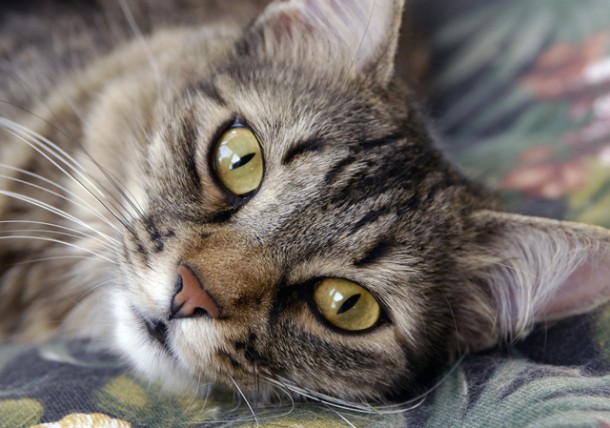Heart Disease in Cats

In contrast to dogs, the majority of heart disease in cats affects the muscular part of the heart, rather than its valves, electrical system or the sac surrounding the heart. Most of the heart is a muscle that serves to constantly pump blood throughout the body. Cardiomyopathy refers to diseases that affect the heart muscle. There are several different types of cardiomyopathy in cats, the most common of which is called hypertrophic cardiomyopathy (HCM).
What does HCM do to my cat’s heart?
In HCM, the heart muscle starts to thicken as the disease progresses. From the outside, the heart appears relatively normal, but the chambers of the heart (where the blood flows) get progressively smaller. Over time, this affects the heart’s ability to effectively pump blood throughout the rest of the body. When that happens, fluid starts to build up in the lungs.
What are the Symptoms of HCM?
On occasion, your veterinarian may note a heart murmur, or abnormal sound, when listening to your cat’s heart. Unfortunately, until the heart begins to fail and fluid builds up in the lungs, often there are no symptoms. Once heart failure begins, your cat will initially start breathing more rapidly, then progress to having difficulty breathing. Coughing is sometimes noted as fluid starts to build up in the lungs.
How is HCM diagnosed?
If your cat presents to the veterinarian with signs of heart failure, the doctor will often use a chest x-ray to diagnose congestive heart failure. Sometimes it is obvious on the x-ray that the heart is enlarged; other times, because the heart enlarges on the inside, other methods are needed to diagnose HCM. Definitive diagnosis may require an ultrasound of the heart, or echocardiogram. Although bloodwork is rarely needed to diagnose heart disease, it is often done to make sure an overactive thyroid is not causing the changes in the heart. It is also vital to monitor for side effects of any heart medicines.
How is heart failure treated?
Once your cat has signs of heart failure, it is important to get it treated right away. The extent of treatment depends on the severity of your pet’s symptoms. Some cases may require immediate hospitalization on oxygen. Other cases may be treated effectively on an outpatient basis.
If there is fluid building up around your pet’s lungs, your veterinarian may need to withdraw some of the fluid with a needle in a procedure called thoracocentesis. If the fluid is within the lungs, medications known as diureticsany substance that promotes the production of urine are used. These may be given in the form of pills or injections. Other medications to strengthen the heart, reduce blood pressure and slow the rate of heartbeats are also sometimes used.
There is no known effective treatment to reverse the changes in the heart caused by HCM. Treatment is aimed at reducing symptoms and preventing heart failure.
My cat has heart disease, but it is not HCM.
Other types of diseases can affect cats’ hearts. On occasion, cats will develop a form of cardiomyopathy called dilated cardiomyopathy (DCM) that causes the walls of the heart to thin and enlarge over time. A dietary deficiency of an amino acid called taurine is one cause of DCM. Cats on a commercial cat food diet are not usually at risk for taurine deficiency; however, if you feed your cat a homemade diet, your veterinarian may want to test your pet’s level of taurine. Other types of heart disease that occur include unclassified cardiomyopathy, restrictive cardiomyopathy, arrhythmogenic right ventricular cardiomyopathy and various congenital malformations.
Can I prevent heart disease in my cat?
Unlike in people, heart disease in cats is not related to lifestyle. Obesity, sedentary lifestyle and cholesterol have no relationship to cardiac problems. Diet only plays a role in the rare case of DCM caused by an inappropriately formulated homemade diet.
The biggest factor in the development of heart disease is the individual animal’s genetic make-up. Certain breeds are more predisposed to HCM, especially Maine Coons, Ragdolls, Norwegian Forest Cats and Sphynx. Genetic tests for HCM in certain purebred cats are available. However, many cases of HCM in cats occur in cats that are not purebred. The underlying cause is unknown in most cats, and there are no effective ways to predict which cats may be predisposed to develop the disease or to prevent its occurrence.
What is my cat’s prognosis?
The prognosis depends on the severity of your cat’s disease. Certain forms of HCM rapidly progress and may occur even in young animals. Other forms tend to be quite stable over time, and if diagnosed early, your cat may not show signs for a long time.
Many cases of heart disease are diagnosed after a cat has gone into heart failure. For cats with HCM that have already experienced an episode of heart failure, the disease should be expected to shorten the cat’s lifespan. Appropriate monitoring of the disease and treatment with medications can extend the cat’s life and ensure he or she remains comfortable during that time.
Suzanne Brown, DVM, is a graduate of Texas A&M College of Veterinary Medicine who lives in Belton, Texas. Dr. Brown practices at Belton Small Animal Clinic and Central Texas Mobile Veterinary Ultrasound.

